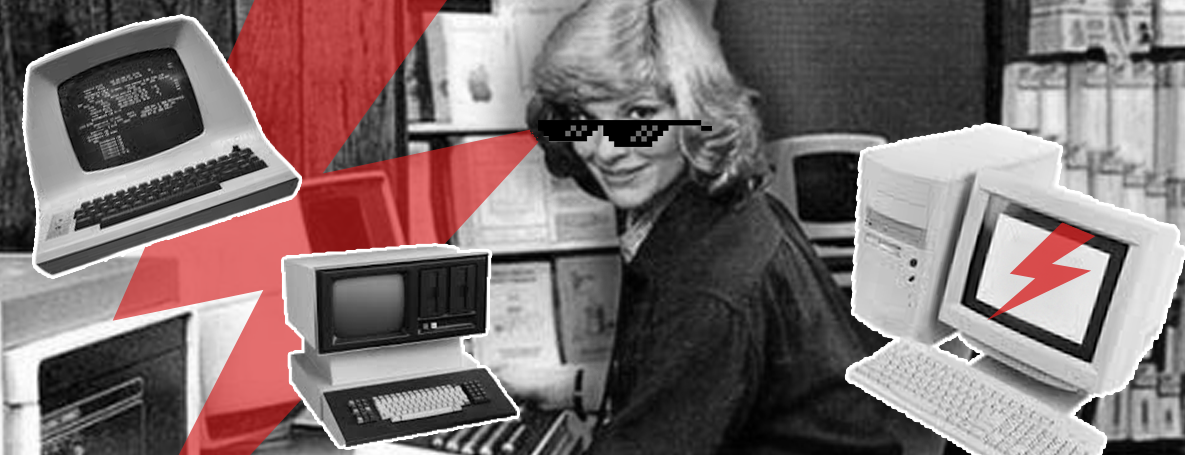
Perks of a digital ad agency
Why is it fun to work at Voltage? Oh, let us count the ways.



The origins of programming are explicitly feminist and more diverse than the male faces we see adorning the majority of cubicles today.
“Women generally also have a stronger interest in people rather than things, relative to men. These two differences in part explain why women relatively prefer jobs in social or artistic areas.”- James Damore, author of the “anti-diversity”
The self-anointed arbiters of Silicon Valley’s ethos, like biological essentialist and former Google employee James Damore who was behind last summer’s infamous viral “anti-diversity” memo, would have you believe the tech industry was always mostly male.
If these elite purveyors of the “bro-grammer” class were your only source of authority on the historical origins of the tech industry, you would think men were the only ones ushering in the game-changing technical innovations we all take for granted today. This is a misleading trope at best, and worse, an insidious mythology that betrays the history of computer science.
The crux of the Google memo asserts that diversity initiatives at Google — and in the industry as a whole — are counterproductive because men and women are biologically predisposed to different things. Blessed with naturally and radically different aptitudes.
This, of course, explains the drastic disparity between men and women in the tech industry and in high-paying managerial positions. We have seen this same strain of biological determinism in other workplaces and facets of society thanks to entire generations conditioned to believe that one’s exceptional qualities, or lack thereof, are determined by gender.
Our grandparents didn’t see Katherine Johnson, Dorothy Vaughan and Mary Jackson when they watched Neil Armstrong on their television. These three women are the subject of the 2016 film “Hidden Figures” depicting the (mostly) female group who calculated the complex equations that sent men into space. (Not to mention that women were not allowed to be astronauts themselves until 1978. It wasn’t until 1983 that Sally Ride became the first American woman in space.)
Perhaps worse, credit for the contributions of black women working for NASA were long attributed to male supervisors. Without knowing this, one might assume the history of space travel and science as a whole was always given to us by men. Just as so many believe to be true for computer science.
It’s actually quite the opposite. The origins of programming are explicitly feminist and more diverse than the male faces we see adorning the majority of cubicles today. Perhaps to the chagrin of Damore and his ilk, the first computer programmer was actually a woman. One of the earliest computer programming languages, ADA, was named after Ada Lovelace, or Countess of Lovelace, who was originally pushed into mathematics in the 19th century as to not follow her father Lord Byron’s whimsical path of poetry. Ironically, Ada came to see the poetry in math and teamed up with Charles Babbage to lay the blueprint for the first electronic computer.
Many years later in 1945, Jean Jennings Bartik and her team of five other female mathematicians, created the first programs for ENIAC, one of the world’s first fully electronic computers. The same group of women eventually worked with Grace Hopper, who pioneered programming computers with words rather than numbers, and created the COBOL programming language. It was only after Hopper’s retirement that we saw more computer science majors and tech industry positions filled by men.
All that said, highlighting these feminist origins of a now male-dominated industry goes beyond a history lesson. Until the reactionary attitudes that continue to persist in the tech industry today are mitigated and a spirit of allyship, mentorship and equality fostered, we will continue to see more screeds like the Google memo. And we will continue to rob ourselves of the powerful contributions women have to make.
As an industry, we must strive to provide opportunities for women to take on leadership roles and get the mentorship men have been given freely for decades. In and out of the office, men in this industry can also do a great deal themselves to speak up against sexist attitudes. They can take the opposite position of James Damore and focus on mentoring women interested in tech. Ultimately, to honor the feminist origins of the tech industry, it is up to all of us to give back and proactively advocate for equal opportunities so that technical innovation itself reaches its full potential.
For more information on VOLTAGE call 303-664-1687 or email us at info@voltagead.com.
VOLTAGE is a digital agency specializing in eCommerce, digital brand experiences, and web apps. Get emails and insights from our team:

Why is it fun to work at Voltage? Oh, let us count the ways.

Looking for the right eComm platform? Recent Shopify Plus updates may make it the best option for your eComm site. Even better than Demandware.